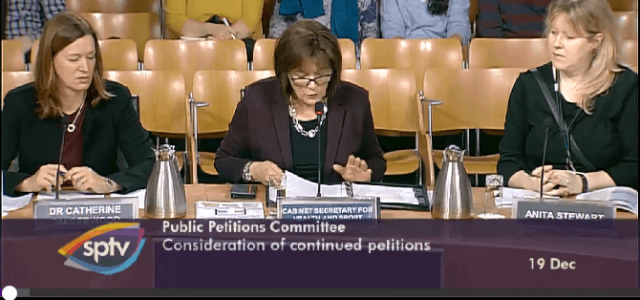On Thursday 19th December, 2019 the Scottish Parliament’s Public Petitions Committee met to continue its consideration of #MEAction Scotland’s petition, PE1690, which calls for a review of treatment of people with myalgic encephalomyelitis (ME) in Scotland. Appearing before the committee to give evidence were Jeane Freeman, the Scottish Government’s Cabinet Secretary for Health and Sport, Dr Catherine Calderwood, Chief Medical Officer for Scotland and Anita Stewart, a senior civil servant and team leader on Scottish Government clinical priorities. A transcript of the meeting is available here and a video is available here.
Ms Freeman reiterated the Scottish Government’s commitment to ensuring that everyone living with a neurological condition, including ME, in Scotland has access to the best possible care and support and benefits from healthcare services that are safe, effective and person-centred. She then proceeded to highlight developments, relevant to the aims of #MEAction Scotland’s petition, which had taken place since the previous committee evidence session. These included the launch of Scotland’s first framework for action on neurological care and support. Despite not being condition specific, Ms Freeman did repeat several times the Scottish Government’s recognition of ME as a neurological condition. This framework has the following 5 aims:
· Ensure people with neurological conditions are partners in their care and support
· Improve the provision of co-ordinated health and social care and support for people with neurological conditions
· Ensure high standards of effective, person-centred, and safe care and support
· Ensure equitable and timely access to care and support across Scotland
· Build a sustainable neurological workforce fit for the future
These aims are underpinned by a series of 17 commitments setting out the actions that the Scottish Government will take in order to meet the aims of the framework. Some of these commitments Ms Freeman claimed, such as support for ME-specific neurological research and improved collection of prevalence data on ME, directly addressed the aims of #MEAction Scotland’s petition. #MEAction Scotland welcomes the publication of the framework and is currently examining the commitments to assess how relevant they are to people with ME.
Towards the end of her statement, Ms Freeman made reference to two pieces of work recently commissioned by her department. The first is an updated needs assessment by the Scottish Public Health Network to understand the provision for ME in Scotland. The second involves consultations with lived experience of ME, facilitated by the Scottish Health Council, to find out what good care and support for people with ME looks like.
Following these pieces of work being completed in Spring 2020, a short life working group will be convened. This will include people with lived experience of ME and clinicians and will look at what practical steps can be taken to improve provision for people with ME in advance of the publication of the draft of the revised National Institute for Health and Care Excellence (NICE) guideline on ME.
NICE recently provided an update on the timing of its revised guideline on ME that postponed publication of the draft until July 2020 and the final version until December 2020. This delay is disappointing, not only because a review of this guideline is long overdue, but also because Ms Freeman tied updating the Scottish Good Practice Statement (guidance for Scottish healthcare professionals) to its publication. In practice, this means that changes with regard to graded exercise therapy (GET) and cognitive behavioural therapy (CBT) will now not be considered ahead of the NICE publication date.
However, despite claims from both Ms Freeman and Dr Calderwood that CBT/GET had proved beneficial to some patients, following repeated questioning from committee convener, Johann Lamont, Dr Calderwood did undertake to look at the PACE trial and the related evidence for recommending CBT/GET as treatments.
“I can ask Chris Ponting and others to help me look at the PACE trial. Like the Cabinet Secretary, I do not find it acceptable that patients are reporting that a certain treatment is unhelpful for them but are being encouraged to continue with it, with no other offer being made.”#MEAction Scotland are working closely with Anita Stewart to ensure that the Government’s commitments on ME are fulfilled. We have already seen our petition and evidence submissions lead to action on the part of the Scottish Government and we are determined that this must be just the beginning. In order to maintain pressure on the Government, we are working with charities and other organisations to provide a response to the work it has recently commissioned. By combining our resources and experience we can offer more effective and powerful feedback.






3 thoughts on “#MEAction Scotland’s Petition: Progress Continues”
The lack of acceptance that M E/CFS is a physical/biological illness despite the private (patient funded) research going on that proves that it is biological and definitely NOT psychological, beggers belief. In the face of this evidence worldwide, including research here in the UK and USA it seems peculiar and suspect that this psychological treatment of CBT and Graded exercise is still being pushed at patients.
What a waste of £5 million was the Pace Trial. Proven when the documents of this trial were finally released on Court Order and examined by independant scientists. They found that the guidelines were altered halfway through the trial and the benefits supposedly of 60% improvement in patients did not exist. In fact exercise for patients with M E can be extremely damaging, as we proved with my daughter, and many other patients with M E. There has been an outcry from the M E patient community about this. But WHO is ACTING upon this? Who in the Medical and Government is LISTENING? NO-ONE IS ACTING UPON INFORMATION STARING THEM IN THE FACE.
How can I take part in the SPHN needs assessment? I was involved in the last one, but have moved cities since then.
Elizabeth Moncrieff
Penny
If you send your contact details to [email protected] we can update you on this.
Comments are closed.